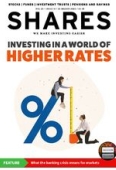Archived article
Please note that tax, investment, pension and ISA rules can change and the information and any views contained in this article may now be inaccurate.
Why a company’s longevity is important to some of the best fund managers

Given some of the most successful fund managers go to the trouble of calculating the average age of companies in their portfolios it is fair to conclude it is an important characteristic of how they invest.
In this article we look at why longevity in companies matters and identify some of the oldest firms across the UK, Europe, and US. Later in the article we look at some of the oldest investment companies in the UK.
Terry Smith’s Fundsmith (B4MR8G8) fact sheet shows the average founding date of companies across its 27 holdings is 1922, or 101 years.
Nick Train, founder of Finsbury Growth and Income Trust (FGT) calculates the average age of companies in its portfolio is 115 years.
FGT’s largest holding RELX (REL) is the result of a merger between Reed International and Dutch firm Elsevier which dates to 1880 while the third largest holding is London Stock Exchange Group (LSEG) which was founded in 1801.
Fund manager Christian Diebitsch at Heptagon Capital also has a penchant for companies which have been around for a long time.
One of the key criteria Diebitsch looks for in these businesses is ‘their end-markets’ need to continuously grow by value and by volume. ‘That way they are unlikely to become mature or turn into cyclical businesses’ the fund manager told Shares.
The average age of the companies across the Heptagon European Focus Equity Fund (BTP3468) is 90 years and the oldest is luxury brand Hermes International (RMS:EPA).
Other holdings which Diebitsch has held ‘pretty much forever’ include medical technology company Coloplast (COLO-B:CPH) beauty products giant L’Oreal (OR:EPA) and Swiss premium chocolate maker Lindt & Sprüngli (LISN:SWX).
One trait which connects these fund managers is their preference for predictable and durable earnings.
The thinking is that if a company can survive events such as world wars and pandemics, the chances are good it can continue to prosper not matter what the future holds.
Because these fund managers envisage sticking around as shareholders for decades to squeeze as much benefit as possible from compounding earnings, durability and predictability are essential attributes of the investment case.
There is a phenomenon pertaining to longevity which supports the case for investing in companies which have stood the test of time. The Lindy Effect is the idea that the older something is the more likely it will stick around in the future.
In his book Antifragile, investor and writer Nicholas Taleb described the Lindy Effect in the following way: ‘The robustness of an item is proportional to its life.’
NO CYCLICAL EXPOSURE PLEASE
A preference for dependability means avoiding speculative and cyclical businesses which may have their ‘day in the sunshine’ during economic expansions but eventually falter in some way.
Research by Hendrik Bessembinder evaluated lifetime returns for every US stock from 1926 to 2015. One of its surprising findings is the average life of a company which turns out to be a meagre seven years.
The standout finding from the research is that the top 1,000 performing stocks (around 4% of the total) accounted for all the wealth created, estimated to be $32 trillion. The other 96% only matched the return from one-month Treasury bills (a short-term US Government debt obligation).
The startling conclusion makes it clear that outstanding companies are relatively rare. Searching for them among those which have already demonstrated a pedigree and staying power seems like a winning investment approach.
An investment case is usually multifaceted, and longevity and durability are only part of the wider story.
There are no guarantees that older businesses will not run into trouble and the banks which feature in the tables are a good reminder of this.
Healthcare and personal goods companies are well represented which suggest they continue to be reliable and dependable. Likewise, some luxury goods and alcoholic beverages firms clearly demonstrate staying power.
Publishing is an old business and the appearance of Pearson (PSON) and John Wiley & Sons (WLY:NYSE) suggests they can be decent businesses despite the challenges from a structural shift online.
Pearson was a holding in Finsbury Income and Growth trust for 18 years until it was sold in the spring of 2022.
THE OLDEST INVESTMENT TRUSTS
Interestingly the oldest investment trusts have been around longer than some of the UK’s oldest surviving companies. While their original purposes have since morphed into other more relevant investment areas, their long tenures suggest they have a key role to play for investors.
A handful including Bankers (BNKR) and City of London Investment Trust (CTY) have increased their dividends every year for the last 50 years.
Investment trusts are closed ended companies which means the capital they have is permanent, provided they maintain the support of shareholders and the board of directors.
The shares trade on the stock market just like other companies and their value can differ from underlying net asset value, creating premiums or discounts.
The oldest trust is F&C Investment Trust (FCIT) which dates to 1868, the same year as the discovery of helium.
It originally focused investing in foreign and colonial government bonds but is now a diversified investor in global stock markets.
The Dunedin Growth Income (DIG) trust was Scotland’s first investment trust and the brainchild of Robert Fleming. It was launched in 1873 to finance the building of the railway network and originally named The Scottish American Investment Trust.
In the same year he founded Flemings, one of London’s most famous merchant banks. Today it is part of JP Morgan Asset Management.
Alliance Trust (ATST) was launched in 1888 and originally founded as a mortgage bank lending to pioneer farmers in the northwest of the US.
The founders of Baillie Gifford launched Scottish Mortgage (SMT) trust in 1909 to offer mortgages to Malaysian rubber plantation owners eager to satisfy demand coming from Ford Motor (F:NYSE) company which was rolling out its Model T car.
Important information:
These articles are provided by Shares magazine which is published by AJ Bell Media, a part of AJ Bell. Shares is not written by AJ Bell.
Shares is provided for your general information and use and is not a personal recommendation to invest. It is not intended to be relied upon by you in making or not making any investment decisions. The investments referred to in these articles will not be suitable for all investors. If in doubt please seek appropriate independent financial advice.
Investors acting on the information in these articles do so at their own risk and AJ Bell Media and its staff do not accept liability for losses suffered by investors as a result of their investment decisions.
Issue contents
Feature
- Why the Credit Suisse bailout has failed to calm investors’ nerves
- What an escalating AI-powered search war might mean for media stocks
- Investing in a world of higher rates
- What should your investment portfolio look like in your 70s?
- Discover the beneficiaries of China’s big reopening in 2023
- Why a company’s longevity is important to some of the best fund managers

 magazine
magazine








